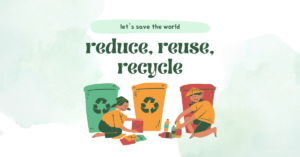Introduction
Recycling plays a vital role in preserving our environment and securing a sustainable future for future generations. By actively participating in recycling efforts, we can significantly reduce waste, conserve resources, mitigate pollution, and foster a sense of community responsibility. In this article, we’ll answer the question, “Why is recycling important?” We will explore the importance of recycling, and its environmental benefits, provide tips and best practices, highlight the role of community involvement, discuss the history, the consequences of not recycling, the decomposition time spans for various products, and the impact of waste on animals.
What is Recycling?
Before we delve into why recycling is important, let’s first understand what it entails. Recycling is the process of converting waste materials into reusable materials. Instead of discarding items as trash, it allows us to transform them into new products, reducing the need for raw materials and minimizing waste.
Environmental impact of recycling
Reduction of landfill waste
One of the primary reasons recycling is crucial is its contribution to reducing landfill waste. Landfills are vast areas where garbage accumulates and decomposes, releasing harmful greenhouse gases into the atmosphere. By recycling, we divert materials from landfills, reducing waste in these sites. This helps combat the issue of limited landfill space and prevents the release of harmful pollutants.
Conservation of natural resources
Recycling plays a crucial role in conserving our planet’s precious natural resources. Many items we use daily, such as paper, plastic, glass, and metals, are derived from valuable raw materials extracted from the earth. By doing the right thing, we can significantly reduce the need for new extraction, conserving resources like trees, oil, minerals, and water. This conservation helps protect ecosystems, preserve biodiversity, and maintain the delicate balance of our planet.
Energy conservation
Another significant environmental benefit is energy conservation. Manufacturing products from raw materials requires a substantial amount of energy. By recycling materials, we save energy that would otherwise be expended in the extraction, processing, and transportation of new raw materials. This reduction in energy consumption helps lower greenhouse gas emissions, decrease reliance on fossil fuels, and mitigate the impact of climate change. It seems logical to include recycling in our quest for more sustainable living, doesn’t it?
Benefits of Recycling
Pollution prevention
Recycling plays a crucial role in pollution prevention. When waste materials are disposed of in landfills or incinerated, they can release harmful chemicals and pollutants into the air, soil, and water. We can reduce the need for such disposal methods, minimizing pollution and safeguarding the environment for future generations. Recycling also helps prevent the extraction of new materials, which can result in habitat destruction, deforestation, and further pollution from resource extraction processes.
Conservation of resources
We can protect forests, reduce water consumption, and preserve habitats by reusing materials instead of extracting new ones. Conserving resources benefits the environment and ensures their availability for future generations. Additionally, recycling helps conserve water, a vital resource essential for various ecosystems and human activities.
Economic benefits
Recycling also brings about economic advantages. The recycling industry creates jobs in various sectors, including collection, sorting, processing, and manufacturing. Additionally, recycling materials reduces the costs associated with raw material extraction and processing. This cost-effectiveness can positively impact industries and economies, promoting sustainable development. Moreover, it reduces the burden on waste management systems and can lead to potential cost savings for municipalities and communities.
Energy savings
Recycling contributes to significant energy savings. As mentioned earlier, manufacturing products from raw materials consumes substantial energy. By recycling, we conserve energy resources, reducing energy consumption and lowering carbon emissions. These energy savings are crucial in mitigating the effects of climate change and fostering a sustainable future. The saved energy can be redirected to other essential needs, promoting efficiency and reducing the demand for fossil fuels.
Recycling Tips and Best Practices
To maximize the benefits, it’s essential to follow some tips and best practices:
Sort and separate recyclables
Ensure you properly sort and separate recyclable materials. Different materials like paper, plastic, glass, and metals have specific processes. Familiarize yourself with the guidelines in your area and sort your recyclables accordingly. This practice ensures that the materials can be efficiently processed and transformed into new products.
Proper disposal of hazardous materials
Some materials, such as batteries, electronics, and certain chemicals, are considered hazardous waste. These items should be placed in something other than regular recycling bins as they can contaminate the process. Disposing of hazardous materials safely and responsibly is essential by taking them to designated collection centers or participating in special collection events.
Buy recycled products
Support the recycling industry by purchasing products made from recycled materials. By choosing recycled products, you create a demand for these items, encouraging manufacturers to incorporate more recycled materials into their production processes. This action closes the recycling loop, creating a sustainable cycle of resource conservation. Look for products labeled with recycled content or those with eco-friendly certifications.
Reduce, reuse, and recycle
Remember the three R’s:
- Reduce, reuse, and recycle.
- Explore ways to reduce your consumption and waste generation.
- Opt for reusable products and containers instead of disposable ones.
- Ensure you follow proper procedures to maximize its effectiveness.
- Consider donating or repurposing items still in good condition to extend their lifespan and reduce the overall waste generated.
Recycling and Community Involvement
Even the history of recycling depicts not just an individual effort but also a collective responsibility. Engaging in activities as a community can have a far-reaching impact on environmental conservation. Here are some ways to promote awareness and encourage community involvement:
Promoting awareness
Educate your community about the importance of recycling and its environmental benefits. Organize awareness campaigns, workshops, or informational sessions to spread knowledge about proper practices. Collaborate with local schools, community centers, and organizations to reach a wider audience and foster a recycling culture.
Participating in recycling programs
Encourage community members to participate in recycling programs actively. Collaborate with local authorities or waste management agencies to establish convenient collection points or curbside pickup services. Provide information on what can be recycled and how to prepare recyclables for collection properly. Encourage participation by organizing drives or events where residents can drop off their recyclable materials.
Encouraging sustainable habits
Promote sustainable habits within your community. Encourage practices such as reducing single-use plastic, composting organic waste, and conserving water and energy. Engage in local initiatives like community gardens or clean-up campaigns to create a sense of environmental stewardship and collective responsibility.
By involving the community, we can amplify the positive impact and foster a sustainable mindset beyond individual actions.
History of Recycling
Recycling is not a new concept. It has roots that can be traced back centuries. Throughout history, humans have found ways to reuse materials and minimize waste. Ancient civilizations, such as the Romans and Greeks, practiced recycling by melting and reshaping metals to create new objects. In medieval times, parchment manuscripts were scraped and reused for new writings.
The modern recycling movement gained momentum in the late 19th century when the effects of industrialization and mass production became more apparent. The increased production of goods led to a surge in waste generation. Recognizing the need for resource conservation, communities began implementing appropriate initiatives.
The first recycling mill in the United States was established in Baltimore in 1874, which recycled cotton and linen rags into paper. During World War II, efforts intensified as resources became scarce, and materials such as metal, rubber, and paper were collected for reuse in the war effort.
In the following decades, recycling continued to evolve and gain recognition as an essential environmental practice. The 1970s marked a significant turning point with the establishment of the first Earth Day in 1970 and the subsequent formation of the Environmental Protection Agency (EPA) in 1972. These events raised public awareness about environmental issues and sparked the development of recycling programs and legislation.
Today, it has become an integral part of waste management systems in many countries worldwide. Governments, organizations, and individuals actively promote and find innovative solutions to address the challenges of waste management and resource conservation.
What Will Eventually Happen if We Don’t Recycle?
The consequences can have far-reaching and detrimental effects on the environment, society, and future generations. Here are some potential outcomes if we fail to prioritize recycling:
Increased waste generation: The volume of waste destined for landfills or incineration will continue to rise. This can lead to overflowing landfills, strained waste management systems, and increased pollution from waste disposal methods.
Depletion of natural resources: We would need to rely solely on virgin materials to produce goods. This leads to excessive extraction of natural resources, including minerals, fossil fuels, and timber. Over time, the depletion of these resources can result in habitat destruction, loss of biodiversity, and ecosystem imbalances.
Accelerated climate change: By recycling materials, we conserve energy that would otherwise be required for raw material extraction and manufacturing processes. Failure to recycle can result in increased energy consumption, higher carbon emissions, and a more accelerated pace of climate change.
Pollution and environmental degradation: Materials often end up in landfills or incineration facilities. This can contribute to releasing harmful pollutants into the air, soil, and water, further degrading the environment. Additionally, the improper disposal of hazardous materials can pose risks to human health and contaminate ecosystems.
Loss of economic opportunities: The recycling industry creates jobs in collection, sorting, processing, and manufacturing. Failing to recycle means missing out on these economic benefits and potential job growth in the green sector.
To avoid these consequences, we must prioritize recycling as a fundamental practice in our daily lives and work towards building a circular economy that promotes resource conservation and sustainability.
Time Spans for Product Decomposition
One of the significant reasons recycling is important is the long decomposition time of certain materials. When waste materials are not recycled, they end up in landfills or as litter, taking an extensive period to break down. Here are some estimated decomposition time spans for various products:
- Plastic: Plastic is notorious for its long decomposition time. While the exact duration varies depending on the plastic and environmental conditions, it can take hundreds of years for plastic to decompose. For instance, a plastic bottle may take around 450 years to break down.
- Glass: Glass is made from natural materials like sand and does not decompose. However, it is inert and can take thousands of years to break down under normal environmental conditions.
- Aluminum cans: Aluminum cans can take several hundred years to decompose. However, aluminum is highly recyclable, and a single aluminum can save enough energy to power a television for three hours.
- Paper: Paper typically decomposes faster than plastics. However, the lack of oxygen and moisture can slow down the decomposition process when the paper is sent to landfills. Under favorable conditions, such as composting, paper can decompose within a few weeks to a few months.
- Organic waste: Organic waste decomposes relatively quickly in the right conditions, such as food scraps and yard waste. Composting can help accelerate the decomposition process, turning organic waste into nutrient-rich compost in months.
It’s essential to note that these decomposition periods are estimates and can vary based on environmental factors such as temperature, moisture, and the presence of oxygen. Recycling these materials helps prevent long decomposition periods, saves valuable resources, and reduces environmental impact.
Horror Stories of Waste and Animals
The impact of waste on animals is an alarming reality highlighting the urgent need for recycling and responsible waste management. Here are some examples of horror stories related to waste and its detrimental effects on animals:
- Plastic pollution in the ocean: Plastic waste, particularly single-use plastics like bags, bottles, and packaging, poses a severe threat to marine life. Animals such as sea turtles, whales, dolphins, and seabirds mistake plastic debris for food or become entangled. This can lead to injury, suffocation, digestive blockages, and even death.
- Plastic rings and wildlife entanglement: Plastic rings used to hold cans or bottles together can cause animal entanglement. Creatures like birds, turtles, and marine mammals can get trapped in these rings, leading to injuries, amputations, or strangulation. Properly disposing of and cutting these rings before recycling can help prevent such incidents.
- Littered fishing gear: Abandoned or lost fishing nets, lines, and traps, known as “ghost gear,” continue to catch and entangle marine life even when no longer in use. This can result in severe injuries, deformities, or death for marine animals, including fish, seals, and sea turtles. Proper disposal of fishing gear is crucial to minimizing these hazards.
- Hazardous waste and wildlife poisoning: Improper disposal of hazardous materials, such as batteries, pesticides, and chemicals, can contaminate habitats and poison wildlife. Animals that come into contact with or consume these toxic substances may suffer from health issues, organ damage, or even death. Responsible disposal of hazardous waste is vital to protecting both animals and ecosystems.
These horror stories are powerful reminders of our waste’s impact on the natural world. By adopting responsible waste management practices, we can reduce the risk of such incidents and protect the well-being of animals and their habitats.
Conclusion
Recycling is undeniably essential for a sustainable future. Reducing landfill waste, conserving natural resources, preventing pollution, and promoting energy savings significantly contributes to environmental preservation. Incorporating recycling into our daily lives through proper waste management, responsible disposal, and conscious purchasing decisions can profoundly and positively impact our planet.
History showcases its evolution as a fundamental practice in waste management while understanding the consequences of not recycling highlights the urgent need for collective action. Considering the decomposition periods of different products reminds us of the long-lasting effects of waste, and the horror stories related to animals and waste serve as stark reminders of the urgency to protect wildlife and their habitats.
By embracing recycling, advocating for responsible waste management, and involving communities in related initiatives, we can create a greener, cleaner, and more sustainable future for future generations.
FAQs
- Does recycling really make a difference?
- Absolutely! It is crucial in waste reduction, resource conservation, pollution prevention, and energy savings. Every small act contributes to a collective effort to preserve our environment.
- What happens to recyclable materials after they are collected?
- After collection, they undergo sorting, processing, and transformation into new products. The specific processes depend on the material type and local facilities. These materials are then used as raw materials for manufacturing new products.
- Can I recycle items with food residue?
- It’s best to rinse or clean containers to avoid contamination. Excessive food residue can affect the recycling process, so removing as much as possible is advisable. However, some materials, like greasy pizza boxes, may not be suitable due to the difficulty separating the greased portion.
- Is recycling economically viable?
- Yes, it brings economic benefits by creating jobs and reducing costs associated with raw material extraction. It also promotes a more sustainable and efficient use of resources, leading to potential cost savings for industries and communities.
- How can I encourage others?
- Lead by example and educate others about the importance of recycling. Share information, provide resources, and emphasize its positive impact on the environment and future generations. Encourage community involvement, organize awareness campaigns, and collaborate with local organizations to promote initiatives.





Pingback: Recycle Projects for Kids: Crafting a Greener Future
Pingback: Why Recycle? Your Ultimate Guide to the Big Green Reason - Eco Life Wise
Pingback: Eco Friendly Toilet Paper: A Cheeky Guide to Going Green - Eco Life Wise
Pingback: Facts About Recycling: - Eco Life Wise
Pingback: Recycled Glass Countertops: The Eco-Friendly and Stylish Choice - Eco Life Wise
Pingback: How to Live Off the Grid: Your Ultimate Guide
Pingback: Goodwill Recycling: Transforming Lives and Our Planet
Pingback: Benefits of Recycling: Maximizing Your Impact for a Greener Planet
Pingback: 15 Facts About Recycling You Probably Didn't Know
Pingback: Recycling for Kids: Discover the Secrets of Saving the Planet
Pingback: History of Recycling: A Journey From Trash to Treasure
Pingback: Is Cardboard Recyclable? You Might Be Surprised | Eco Life Wise
Pingback: Are Bioplastics Better Than Traditional Plastics? 6 Factors You May Not Know | Eco Life Wise
Pingback: Recycling for Kids: A Journey Towards a Sustainable Future
Pingback: World Environment Day: A Deep Dive | Eco Life Wise
Pingback: Cleaning Up: Top Grants for Recycling, Garbage, Waste Reduction and Trash